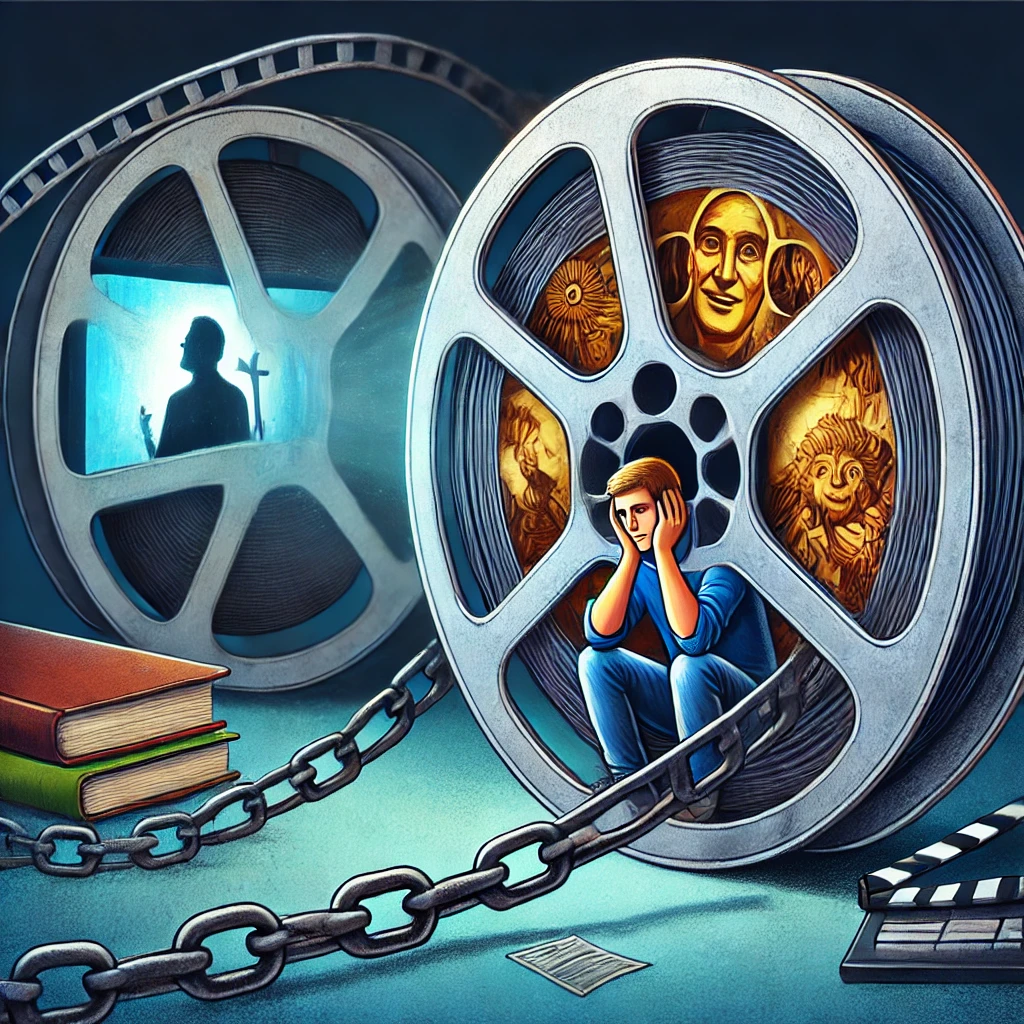Introduction
It all started innocently enough with Instagram reels. The algorithm cleverly used short, engaging clips from movies to pique my curiosity. I found myself wondering, What happens next in that movie? This curiosity led me down a rabbit hole of searching for movie names and eventually watching them.
At first, I watched 2-3 movies a week—a harmless escape, or so I thought. But what began as casual entertainment quickly spiraled into a full-blown addiction. Before I knew it, watching movies wasn’t just a hobby—it had become an uncontrollable habit, influencing my thoughts, emotions, and even my perception of reality.
The Escalation of Addiction
Over time, my movie-watching habits intensified. I started creating extensive watchlists, always looking for the next best movie to satisfy my growing urge. What started as a weekend treat soon became a daily routine. Eventually, I was consuming 1-3 movies each day.
Why Does This Happen?
Psychologists describe this as “dopamine-driven reinforcement”—our brains crave rewards, and movies deliver instant gratification through engaging narratives, visual effects, and emotional highs. Watching movies triggers dopamine release, reinforcing the behavior and making us want more.
Scientific studies confirm that binge-watching is linked to mental health concerns such as:
- Depression and Anxiety – Overconsumption of media can reduce real-life engagement, leading to increased feelings of isolation.
- Sleep Disturbances – Watching movies late at night can disrupt circadian rhythms, reducing sleep quality.
- Emotional Numbness – Over time, frequent exposure to extreme emotional highs and lows in movies can dull real-life emotional experiences.
Research Insight: A systematic review found that binge-watching is significantly linked to sleep deprivation, anxiety, and procrastination, especially during periods of social isolation (PMC.NCBI.NLM.NIH.GOV).
The "Main Character" Syndrome
One of the most profound psychological effects I experienced was the “main character syndrome.”
I began perceiving myself as the protagonist of the movies I watched, expecting my life to mirror theirs. I unconsciously started:
- Comparing my life and struggles to fictional characters.
- Expecting cinematic moments in real life.
- Projecting unrealistic expectations onto relationships, careers, and personal achievements.
Movies are designed to romanticize life—they cut out the mundane, skip the boring parts, and highlight dramatic peaks. When you watch too many movies, your real life starts feeling dull in comparison.
Real-World Example: This is similar to how romantic movies set unrealistic expectations for relationships. The grand gestures, perfect timing, and flawless dialogues in films create a false perception of love, which can lead to dissatisfaction in real relationships.
Scientific Support: Studies suggest that media exposure can distort our perception of reality. The "Mean World Syndrome", a concept from media psychology, explains how excessive exposure to dramatic and unrealistic portrayals of life makes people overestimate or misinterpret real-world events (Wikipedia).
Furthermore, movies often misrepresent mental health conditions, contributing to societal misconceptions. For example:
- OCD (Obsessive-Compulsive Disorder) is often portrayed as an amusing personality quirk, rather than the debilitating condition it truly is.
- Dissociative Identity Disorder (DID) is frequently exaggerated for cinematic effect, leading to stigmatization.
A study analyzing top-grossing films found that mental health disorders are frequently depicted inaccurately, reinforcing harmful stereotypes (Annenberg.USC.edu).
The Psychological Toll
The impact of excessive movie-watching goes beyond entertainment—it alters brain functions, behaviors, and social interactions.
🔴 Impaired Cognitive Function:
I noticed a decline in critical thinking and decision-making abilities. Movies provide ready-made stories and emotions, which reduces our need to think critically. Studies suggest that excessive screen time impairs cognitive flexibility, affecting memory, attention, and executive functions (TheGuardian.com).
🔴 Social Withdrawal:
I became more isolated, preferring fictional narratives over real-life conversations. Instead of hanging out with friends or pursuing hobbies, I spent hours immersed in cinematic worlds. Excessive media consumption has been linked to increased feelings of loneliness and decreased social engagement (PMC.NCBI.NLM.NIH.GOV).
🔴 Reduced Productivity and Motivation:
Watching movies became a form of procrastination. Instead of working toward personal goals, I justified my addiction by telling myself:
"One more movie won’t hurt. I’ll start tomorrow."
Over time, I noticed a lack of drive and ambition. Movies provided instant gratification, making it harder to commit to long-term real-life goals.
Turning Point and Recovery
Realizing these effects, I knew I had to make a change.
In November 2024, I set a hard rule:
🚫 No more movies until I achieved my personal goals.
This decision led to remarkable improvements:
- ✅ Enhanced Focus – I could concentrate on important tasks without distractions.
- ✅ Better Decision-Making – I felt more in control of my choices.
- ✅ Improved Social Interactions – I engaged more meaningfully with people around me.
Scientific Support: Studies confirm that reducing screen time improves cognitive functions, increases social engagement, and enhances emotional well-being (TheGuardian.com).
Lessons Learned
Breaking free from movie addiction was challenging but rewarding. Here’s what I learned:
- Moderation is key – Movies are not inherently bad, but they should never replace real-life experiences.
- Awareness is power – Understanding the psychological effects of media consumption helps maintain a balanced perspective.
- Real-life is not a movie – Embrace imperfections, slow progress, and unpredictability—because that’s what makes life real.
Conclusion
Movies can be a source of inspiration and entertainment, but unchecked consumption can have detrimental effects on mental health, cognition, and social well-being.
If you find yourself watching movies out of habit rather than enjoyment, ask yourself:
- 👉 Am I watching to escape reality?
- 👉 Is this affecting my productivity and social interactions?
- 👉 Am I starting to believe my life should mirror movies?
If the answer is yes, it might be time to take a break.
Understanding the psychological impacts of excessive media consumption empowers us to make informed choices and lead healthier, more fulfilling lives.
